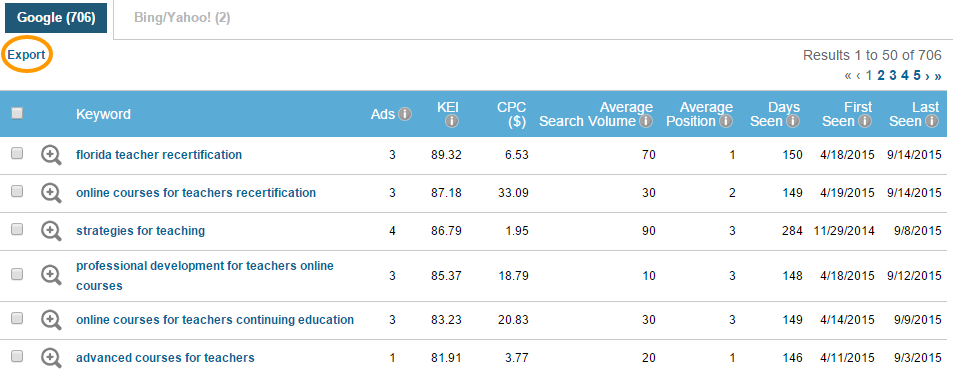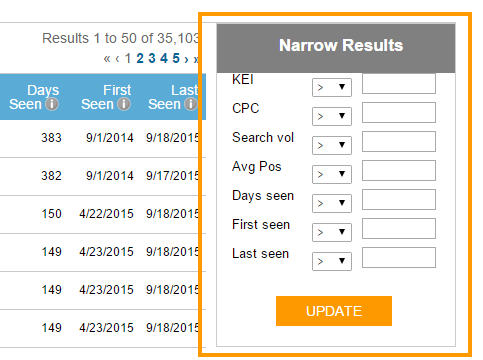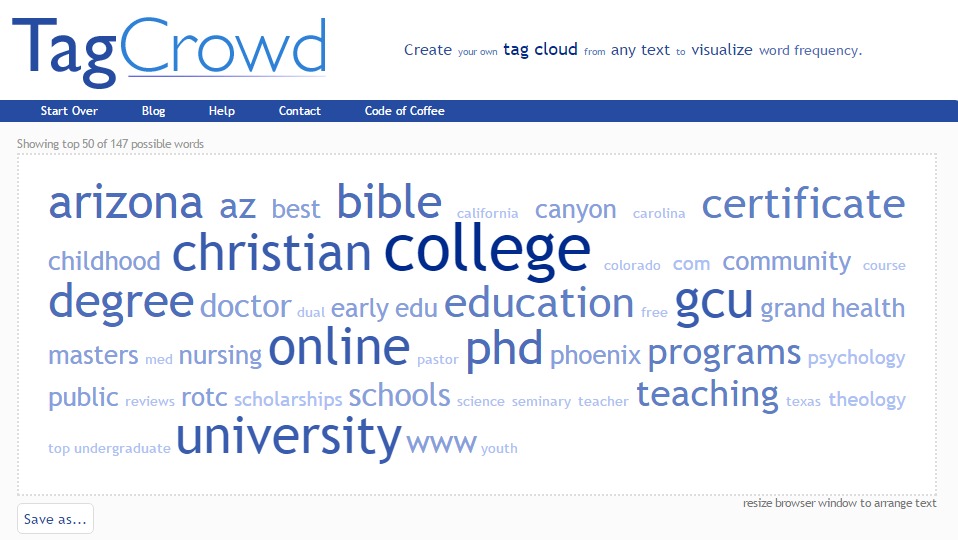
There’s keyword research, and then there’s competitive keyword research.
So what’s the difference?
With regular keyword research, you use tools like the Google Keyword Planner, KWFinder, or UberSuggest to find words you can advertise for based on what Google or one of those other companies decide is related to the term you’ve entered.
For example, if you enter “adwords competitors” into KWFinder, it returns the following related terms.
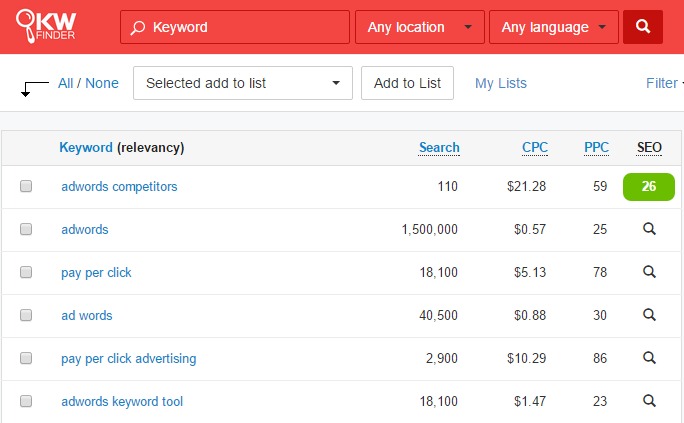
Keyword research is a basic concept and most digital marketers have a preferred “go-to” tool they use to identify new SEO and PPC keywords.
But competitive keyword research spices things up a bit.
With competitive keyword research, you get access to all of the terms your competitors or other advertisers are bidding on AND all the terms they’re ranking for organically.
Pretty cool, right?
So when does this come in handy?
A Few Scenarios Where Competitive Keyword Research Comes in Handy
Scenario #1: Creating a new PPC campaign from scratch
When it comes to creating a new PPC campaign from scratch, competitive keyword research is extremely useful, especially if you’re a PPC consultant or agency working with a new client.
Let’s say, for example, that you’re working with a competitor of AdvancementCourses.com, a company that offers professional development courses that can be taken online.
Instead, of starting the new campaign from scratch, you enter “advancementcourses.com” into a competitor keyword tool like iSpionage.
What you really need to pay attention to is the circled “Export” button which we’ll talk more about later.
For now, make a mental note that competitive keyword research tools give you access to a full list of your competitors’ keywords which in this case is 705 total keywords which can be downloaded with the export button.
Scenario #2: When you’ve run out of keyword ideas
Let’s say in scenario two that you already have a successful PPC campaign, but you’re struggling with finding new, profitable keywords you can add. This is another time when competitive keyword research comes in handy.
Instead of racking your brain until it hurts to find new terms, you can do a competitor search to find out which terms competitors are bidding on that you’re not.
With iSpionage, for example, you can click on the Competitors tab (as seen below), and then pay attention to the “Unique Keywords” and “Overlap Keywords” columns.

In this example, Phoenix.edu has 245,522 unique keywords they show up for and only 78 overlap keywords with AdvancementCourses.
This represents a lot of keywords that AdvancementCourses could be bidding on, but also a nearly unmanageable number of keywords. The good news is that we’ll talk later about how to sort these terms so they’re the number is more manageable. Make sure you stay around for that.
Scenario #3: When you’re looking for SEO terms to write content for
Last but not least, you can use competitive keyword research to find SEO terms your competition is ranking for that you can potentially write long-tail content to rank for organically.
Using our previously mentioned example, you can click on the SEO tab to see which organic terms AdvancementCourses is ranking for. As you see below, they’re only ranking for 40 terms, but if you aren’t currently ranking for any of them then you could write content to target these terms and will know that if you do start ranking for them then you’ll be side-by-side or above one of your direct competitors.
These are a few of the scenarios where competitive keyword research comes in handy. Now that we’ve covered the basics, let’s roll up our sleeves to learn how to get even more out of the time we invest in competitive keyword research.
How to Find the Most Valuable Terms Your Competitors’ Are Bidding On
As I’m sure you noticed above, competitive keyword research is extremely helpful when it comes to expanding your keyword list to find new, profitable keywords. What isn’t so easy is extracting those profitable keywords when you have a list of 25,000, 50,000, or 100,000+ keywords.
The good news is that’s what this section is all about.
In order to find the most profitable keywords and not spend the rest of the year sifting through thousands upon thousands of individual terms, you need a way to sort the terms to find which ones are the most valuable.
At iSpionage, we have a handy sorting feature for this.
First, pull up a website whose terms you want to analyze. For this example, we’re going to use GCU.edu, a competitor of AdvancementCourses. When we enter GCU.edu, we see that they’re bidding on 34,956 keywords and 8,028 Bing keywords.
In order to sort these terms into a more manageable list, we’re going to use the nifty sorting tool shown below.
This feature allows you to sort GCU.edu’s keywords by KEI (Keyword Effectiveness Index, a proprietary iSpionage scoring metric that ranks keywords based on how long they’ve been used, the average position, and when they were last seen), CPC, search volume, average position, days seen, first seen, and last seen.
You can decide which metrics work best for you, but I like to use the following settings to narrow results (keeping in mind you can always play with the settings to narrow the list down as small or large as you’d like).
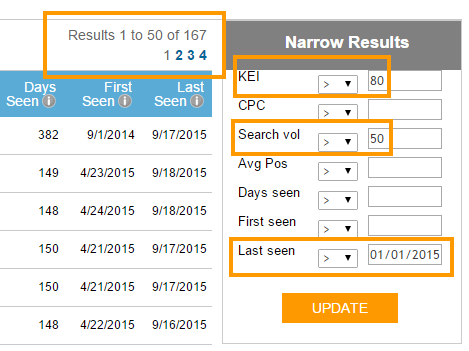
Boom! We’ve now narrowed the results from over 34,000 to 167 of the most profitable terms based on traffic volume, KEI score, and whether or not the keyword was used within the last year.
Bonus Tip: How to Find New Keyword Groups
One final tip is a trick I started using recently to find new keyword group ideas.
First, open a tab and go to www.tagcrowd.com.
Next, copy and paste the list of top keywords we found with the iSpionage competitive keyword tool into TagCrowd (for our example we’re pasting in the top 167 keywords we found from GCU.edu).
Here’s what these terms look like as a tag cloud:
By doing this little exercise, we’ve learned that the highlighted words are some of the most important terms for GCU.edu. We could also use it to come up with the following ad groups if we happen to be a direct competitor.
- Christian college
- Bible degree
- Online masters programs
- Online schools
- Online university
- Nursing programs
- Online nursing programs
- Counseling courses
- Counselor courses
If you’re already advertising with PPC you probably won’t find anything too mind blowing with a tag cloud, but you may uncover an ad group or two that you aren’t bidding on currently which could end up being a new profit source for your business.
This wraps up the in-depth guide to competitive keyword research which you’ve hopefully found helpful. If you’d like to learn more about how competitive keyword research works, visit our homepage at www.ispionage.com and enter a competitor URL or a keyword to get started. You can try it for free in order to find out if competitive keyword research is right for you.
The Author
 Joe Putnam (@josephputnam) is the founder of Conversion Engine. He’s helped organizations increase SEO traffic, conversion rates, and AdWords conversions 10X. Get in touch with him via Clarity to improve your content marketing, SEO, PPC, and CRO results.
Joe Putnam (@josephputnam) is the founder of Conversion Engine. He’s helped organizations increase SEO traffic, conversion rates, and AdWords conversions 10X. Get in touch with him via Clarity to improve your content marketing, SEO, PPC, and CRO results.







